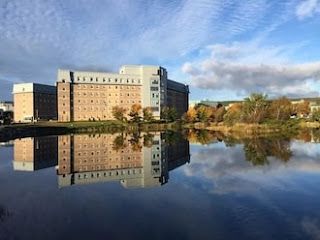Uncategorized
University of Newfoundland: graduation programs and fees
Uh
The Memorial University of Newfoundland
MUN was founded in 1925 as a simple college that eventually grew into one of the most prestigious educational facilities in Canada. The university includes six faculties (the faculty of Arts, Education, Medicine, Sciences, Engineering, and Business Management), six schools that work in different directions, and plenty of undergraduate and postgraduate programs.
The university possesses a research station that is meant for studying the sea and a college where students can study theology. In addition to this, they have a large botanical garden with rare species of plants. There’s a large library in the university, and a range of students’ media means.
If you are willing to become a MUN’s student, they are looking forward to greeting you within one of the available graduate programs that cover humanities and social sciences, interdisciplinary and professional programs, and a number of scientific courses. In addition to the regular studying, you are also able to study online from any point on the globe.
What are the available Memorial University of Newfoundland graduate programs?
Within the sphere of humanities and social sciences, you will be offered twenty-one option to choose from:
- Anthropology (you can receive a graduate diploma, a Master’s degree or a Ph.D.)
- Archaeology (you can receive a Master’s degree or a Ph.D.)
- Classics (you can receive a graduate diploma or a Master’s degree)
- Geography (you can receive a Master of Arts, Master of Sciences, or a Ph.D. degrees)
- Music (you can receive a Master of Music degree)
- German Language and Literature (you can receive a Master of Arts or a Master of Philosophy degree)
- Political Science (you can receive a graduate diploma or a Master’s degree)
- Ethnomusicology you can receive a Master’s degree or a Ph.D.)
- Linguistics (you can receive a graduate diploma, a Master’s degree or a Ph.D.)
- Humanities (you can receive a Master of Philosophy degree)
- English (you can receive a graduate diploma, a Master’s degree or a Ph.D.)
- French Studies (you can receive a Master of Arts degree)
- Arts & Education (you can receive a degree of a Master of Arts & Education)
- Gender Studies (you can receive a graduate diploma and a degree of a Master of Gender Studies)
- Sociology (you can receive a Master’s degree or a Ph.D.)
- Folklore (you can receive a graduate diploma, a Master’s degree or a Ph.D.)
- Religious Studies (you can receive a graduate diploma or a Master’s degree)
- Environmental Policy (you can receive a Master’s degree)
- Philosophy (you can receive a graduate diploma, a Master’s degree or a Ph.D.)
- Economics (you can receive a graduate diploma or a Master’s degree)
- History (you can receive a graduate diploma, a Master’s degree or a Ph.D.)
Within the sphere of interdisciplinary studies, you will be offered nineteen available options:
- Employment Relations (you will receive a Master of Employment Relations degree)
- Aquaculture (you will receive a Master of Sciences degree)
- Environmental Systems Engineering and Management (you will receive a Master of Sciences degree)
- Cognitive and Behavioural Ecology (you can receive a Master’s degree or a Ph.D.)
- Computer Engineering (you can receive a Master of Sciences degree)
- Marine Studies
- Scientific Computing (you can receive a Master of Sciences degree)
- Maritime Management (you will become a Master of Maritime Management)
- Theoretical Physics (you will become a Ph.D.)
- Environmental Science (you can receive a Master degree or a Ph.D.)
- Arts and Education (you will become a Master of Arts and Education)
- Humanities (you will become a Master of Philosophy)
- Technology Management (you will receive a Master’s degree)
- Interdisciplinary (you will become a Ph.D.)
- Fisheries Resource Management (you can receive a graduate diploma or a Master’s degree)
- Gender Studies (you will become a Master of Gender Studies)
- Ethnomusicology (you can become a Master or a Ph.D.)
- Marine Spatial Planning and Management (you will receive a Master’s degree)
- Oil and Gas Engineering (you will receive a Master’s degree)
Within the sphere of professional studies, you are able to choose among 64 available University of Newfoundland graduate studies, and the sphere of sciences includes 26 available options. In case you choose the online studying, you will have a vaster choosing field: there are 450 programs available for online studying in MUN.
University of Newfoundland graduate tuition fees and application
The university claims that they have one of the lowest tuition rates among the universities in Canada. In general, they have a document that’s called the Minimum Expense form, which you can find on their official website. The form will guide you through the compulsory expenses that should be paid by each and every student.
The programs that lead to graduate diplomas and doctoral degrees have a fixed tuition fee. Those students who want to become masters should turn to one of the three available plans: one for full-time students, the other for part-time ones, and the third one is very specific and needs working with the mentioned Minimum Expense plan.
The University of Newfoundland graduate application process is not complicated. If you want to apply, you just need to proceed to the official website of the university and find the list of documents you are expected to provide. You should always remember that the application fee is not refunded in any case.
The only thing you should keep in mind before the application is the deadline. When it’s over, you can’t apply, no matter how hard you try. So, hurry up to check out the website where they have all the necessary details and guidelines.






